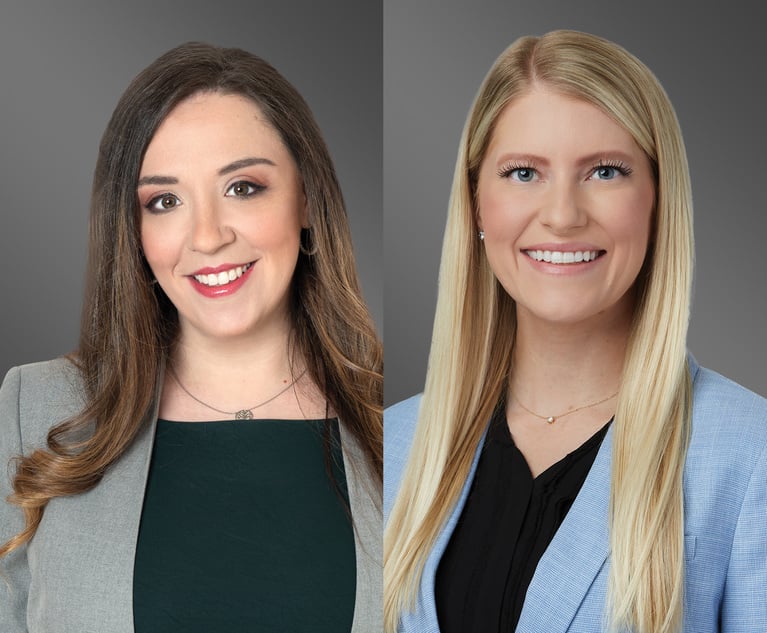On Appeals: Appellate Advocacy and the Duty of Candor
Lawyers must refrain from making false statements of fact or law in their court filings, and must correct any false statements they have previously made. While it may seem that this basic principle should go without saying, adherence to it is not universal.
June 13, 2019 at 06:08 AM
6 minute read
 Sarah Hofstadter of California Appellate Law Group.
Sarah Hofstadter of California Appellate Law Group.
In both state and federal courts in California, lawyers have an ethical duty of candor to any tribunal before which they appear. Under rule 3.3 of the California Rules of Professional Conduct, the duty of candor expressly includes the obligation not to misquote the language of a court opinion or other authority. That means lawyers must refrain from making false statements of fact or law in their court filings, and must correct any false statements they have previously made. While it may seem that this basic principle should go without saying, adherence to it is not universal. After all, we live in an age when some public officials seem to feel free to promulgate “alternative facts” without scruple.
In appellate proceedings, false or misleading statements about the record, and disingenuous characterizations of the applicable law, are not very common—but they are not unknown. And the consequences of such misbehavior are not trivial. As one California appellate court remarked in In re S.C., “Counsel should never misrepresent the holding of an appellate decision. Not only would that be a violation of counsel's duty to the court …, it will backfire because the court will discover the misrepresentation … .” The offending attorney in that case was eventually disbarred (albeit for other even more significant misconduct).
A recent Ninth Circuit order provides an object lesson in how skating too close to the edge of this rule can be disastrous for the offending lawyer. On May 22, in Swinomish Indian Tribal Community v. BNSF Railway Company, No. 18-35704, the court issued an unpublished order directing the appellant's counsel—two large, impressive, white-shoe law firms—to “explain” how a raft of omissions from and insertions in quotations used in the appellant's opening brief “candidly represent[ed]” the content of the quoted materials. The order painstakingly juxtaposed the language used in the brief with the actual language of the opinions or portions of the record being quoted. Although the alterations were duly marked by the use of brackets and ellipses, or by placing added words outside the quotation marks, the contrast between the versions in the brief and the original versions is painfully clear.
For example, an easement involved in the Swinomish case provided that “Burlington Northern agrees that, unless otherwise agreed in writing, only one eastern bound train, and one western bound train, (of twenty-five (25) cars or less) shall cross the Reservation each day.” Appellant's brief, however, stated that “The Easement provides that BNSF may run, at a minimum, 'one eastern bound train, and one western bound train, (of twenty-five (25) cars or less)' across the rail line each day.” By omitting the word “only” from the quoted language, and prefacing the quotation with “at a minimum,” the brief significantly altered the meaning of a key document in the case.
The Ninth Circuit order in Swinomish offered the offending lawyer an opportunity to explain his brief—and it is not clear what, if anything, the court will ultimately choose to do about the problem. In past cases, however, misrepresentations to other courts have resulted in embarrassing published criticism of the lawyer's conduct, or worse, in referrals to the State Bar, contempt findings, or disciplinary action.
For instance, in Fisher v. State Personnel Board, a lawyer who was representing himself in a dispute with his former employer made a statement about the facts of the case at oral argument without disclosing that his credibility on the point had been expressly rejected by the trier of fact. The court publicly took the lawyer to task, noting that his “misrepresentation of facts conclusively established by the record violated his duty of candor to this court.”
In one Third District case, Mammoth Mountain Ski Area v. Graham, a lawyer “misrepresented the record on a crucial point” by stating falsely at oral argument that there was “no evidence” of a certain fact adverse to his client. The published opinion in the case included a separate section lamenting that “[r]ecently, some appellate counsel appearing at oral argument in this court have found it convenient to misrepresent the state of the record. Whether it is to try to gain some advantage (on the assumption that the judges will take what they say at face value) or perhaps simply because they are reckless with the truth, it places an additional burden on the court. We are forced to reexamine the record to verify whether counsel's characterization is correct. [¶] These cavalier mischaracterizations of the record must stop.” It concluded that “[b]ecause it is probable that [name of attorney] has violated subdivision (d) of Business and Professions Code section 6068, … we will request the clerk to forward a copy of this opinion to the State Bar of California.”
Even when it comes to mundane matters such as scheduling and continuances, lawyers must take care to refrain from making misrepresentations to a court. In In re Aguilar, an attorney lied to the California Supreme Court about the circumstances surrounding his failure to appear at a scheduled oral argument. He was found in contempt by the Supreme Court and suspended from practicing law for 30 days.
The State Bar Court has disciplined lawyers on more than one occasion for making false statements in a court proceeding. For example, in In re Chesnut, a lawyer who made “unqualified and unequivocal statements to the judges that he served [a summons on the opposing party] under circumstances that should have caused him at least some uncertainty” received a six-month actual suspension. In another case, In re Maloney, the court emphasized that an attorney commits an act of moral turpitude by making false or misleading statements to a court or tribunal, even if the attorney did not act intentionally, but out of gross negligence in creating a false impression.
The lesson is obvious. Lawyers must take their duty of candor to heart. While failing to do so may be riskiest in appellate proceedings—where the court has the time and resources to compare counsel's representations about the facts and the law with the source material from which they are drawn—being scrupulously honest in all of one's communications with every court is always essential.
On Appeals is a monthly column by the attorneys of the California Appellate Law Group LLP, an appellate boutique with offices in San Francisco and Los Angeles. Sarah Hofstadter is of counsel with the firm and has spent more than a dozen years as a research and staff attorney for jurists on the California Courts of Appeal and the Ninth Circuit. Find out more about Sarah and the California Appellate Law Group LLP at www.calapplaw.com.
This content has been archived. It is available through our partners, LexisNexis® and Bloomberg Law.
To view this content, please continue to their sites.
Not a Lexis Subscriber?
Subscribe Now
Not a Bloomberg Law Subscriber?
Subscribe Now
NOT FOR REPRINT
© 2025 ALM Global, LLC, All Rights Reserved. Request academic re-use from www.copyright.com. All other uses, submit a request to [email protected]. For more information visit Asset & Logo Licensing.
You Might Like
View All
What Will It Mean in California if New Federal Anti-SLAPP Legislation Passes?
9 minute read
For Growing Law Firms, Customizable Financing Can Unlock Opportunities
6 minute read
The Rise of Female Breadwinners: Challenging Traditional Divorce Dynamics
4 minute read
An Overview of Proposed Changes to the Federal Rules of Procedure Relating to the Expansion of Remote Trial Testimony
15 minute readTrending Stories
- 1We the People?
- 2New York-Based Skadden Team Joins White & Case Group in Mexico City for Citigroup Demerger
- 3No Two Wildfires Alike: Lawyers Take Different Legal Strategies in California
- 4Poop-Themed Dog Toy OK as Parody, but Still Tarnished Jack Daniel’s Brand, Court Says
- 5Meet the New President of NY's Association of Trial Court Jurists
Who Got The Work
J. Brugh Lower of Gibbons has entered an appearance for industrial equipment supplier Devco Corporation in a pending trademark infringement lawsuit. The suit, accusing the defendant of selling knock-off Graco products, was filed Dec. 18 in New Jersey District Court by Rivkin Radler on behalf of Graco Inc. and Graco Minnesota. The case, assigned to U.S. District Judge Zahid N. Quraishi, is 3:24-cv-11294, Graco Inc. et al v. Devco Corporation.
Who Got The Work
Rebecca Maller-Stein and Kent A. Yalowitz of Arnold & Porter Kaye Scholer have entered their appearances for Hanaco Venture Capital and its executives, Lior Prosor and David Frankel, in a pending securities lawsuit. The action, filed on Dec. 24 in New York Southern District Court by Zell, Aron & Co. on behalf of Goldeneye Advisors, accuses the defendants of negligently and fraudulently managing the plaintiff's $1 million investment. The case, assigned to U.S. District Judge Vernon S. Broderick, is 1:24-cv-09918, Goldeneye Advisors, LLC v. Hanaco Venture Capital, Ltd. et al.
Who Got The Work
Attorneys from A&O Shearman has stepped in as defense counsel for Toronto-Dominion Bank and other defendants in a pending securities class action. The suit, filed Dec. 11 in New York Southern District Court by Bleichmar Fonti & Auld, accuses the defendants of concealing the bank's 'pervasive' deficiencies in regards to its compliance with the Bank Secrecy Act and the quality of its anti-money laundering controls. The case, assigned to U.S. District Judge Arun Subramanian, is 1:24-cv-09445, Gonzalez v. The Toronto-Dominion Bank et al.
Who Got The Work
Crown Castle International, a Pennsylvania company providing shared communications infrastructure, has turned to Luke D. Wolf of Gordon Rees Scully Mansukhani to fend off a pending breach-of-contract lawsuit. The court action, filed Nov. 25 in Michigan Eastern District Court by Hooper Hathaway PC on behalf of The Town Residences LLC, accuses Crown Castle of failing to transfer approximately $30,000 in utility payments from T-Mobile in breach of a roof-top lease and assignment agreement. The case, assigned to U.S. District Judge Susan K. Declercq, is 2:24-cv-13131, The Town Residences LLC v. T-Mobile US, Inc. et al.
Who Got The Work
Wilfred P. Coronato and Daniel M. Schwartz of McCarter & English have stepped in as defense counsel to Electrolux Home Products Inc. in a pending product liability lawsuit. The court action, filed Nov. 26 in New York Eastern District Court by Poulos Lopiccolo PC and Nagel Rice LLP on behalf of David Stern, alleges that the defendant's refrigerators’ drawers and shelving repeatedly break and fall apart within months after purchase. The case, assigned to U.S. District Judge Joan M. Azrack, is 2:24-cv-08204, Stern v. Electrolux Home Products, Inc.
Featured Firms
Law Offices of Gary Martin Hays & Associates, P.C.
(470) 294-1674
Law Offices of Mark E. Salomone
(857) 444-6468
Smith & Hassler
(713) 739-1250






